Amanda Roberts's Blog, page 17
November 3, 2015
NOW CASTING: Young people who want to go on the adventure of a lifetime!
A NYC-based production company is developing a series about millennials, ages 20-29, who want to change their lives, leave the past behind, and set out to accomplish an extreme goal.
 Do you dream of quitting your 9 to 5 in order to move to the natural wilderness of Alaska? Have you thought about leaving your home country with your bandmates to pursue a music career in America? Do you want to leave city life behind to homestead or live off the grid? Do you have dreams of opening that surf lodge you’ve always thought about, sailing across the globe, or changing your lifestyle entirely? If you are planning to leave behind your old way of life in order to accomplish a major now-or-never goal, we want to talk to you! The company is especially interested in people wanting to relocate to China!
Do you dream of quitting your 9 to 5 in order to move to the natural wilderness of Alaska? Have you thought about leaving your home country with your bandmates to pursue a music career in America? Do you want to leave city life behind to homestead or live off the grid? Do you have dreams of opening that surf lodge you’ve always thought about, sailing across the globe, or changing your lifestyle entirely? If you are planning to leave behind your old way of life in order to accomplish a major now-or-never goal, we want to talk to you! The company is especially interested in people wanting to relocate to China!
For more information and to talk to a casting director please email StephanieLewisCasting@gmail.com with your name, age, location, and a brief description of your goal, and how you plan to make it happen!
November 2, 2015
Book Review: The Palest Ink by Kay Bratt
Check out my interview with Kay Bratt here. Be sure to read all the way to the end for a chance to win a copy of The Palest Ink.
About The Palest Ink
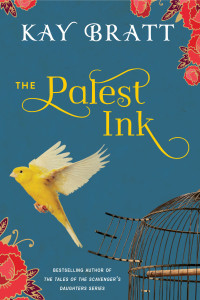 A sheltered son from an intellectual family in Shanghai, Benfu spends 1966 anticipating a promising violinist career and an arranged marriage. On the other side of town lives Pony Boy, a member of a lower-class family—but Benfu’s best friend all the same. Their futures look different but guaranteed…until they’re faced with a perilous opportunity to leave a mark on history.
A sheltered son from an intellectual family in Shanghai, Benfu spends 1966 anticipating a promising violinist career and an arranged marriage. On the other side of town lives Pony Boy, a member of a lower-class family—but Benfu’s best friend all the same. Their futures look different but guaranteed…until they’re faced with a perilous opportunity to leave a mark on history.
At the announcement of China’s Cultural Revolution, Chairman Mao’s Red Guard members begin their assault, leaving innocent victims in their wake as they surge across the country. With political turmoil at their door, both Benfu and Pony Boy must face heart-wrenching decisions regarding family, friendship, courage, and loyalty to their country during one of the most chaotic periods in history.
The prequel to the beloved Tales of the Scavenger’s Daughters series, The Palest Ink depicts Benfu’s coming-of-age during the tumultuous years of the Cultural Revolution.
My Review
Kay Bratt’s latest novel The Palest Ink follows about two years in the lives of Pony Boy (a poor son of a postal worker and factory employee) and Binfu (the son of university academics) at the beginning of the Cultural Revolution (which started in 1966). While the book is interesting and heartbreaking at times, it is important to remember that the Cultural Revolution was actually much worse than it is presented here.
Life in cities such as Shanghai was very different from life in the countryside for most of the Cultural Revolution and its predecessor The Great Leap Forward. Since Binfu and Pony Boy live in Shanghai, they have a measure of protection from starvation, manual labor, and the Red Guards. Information is also highly censored, so no one ever knows what is really going on. However, both of the families live in terror of not knowing what will happen. Because of this, both families make decisions without having all the facts. It is when the boys leave Shanghai that their lives change for the worse, if they could possibly get worse. Probably the most tragic part of the novel is that the major catastrophes that befall them come from their own choices and decisions – although they wouldn’t have had to make such decisions had Mao not declared war on his own people. “If only” plagues this novel, which is frustrating to read, but imagine having to live it.
The book is very easy to read and isn’t too graphic or tragic. It would be appropriate for even young readers. It ends on about as high of note as it could considering it only covers the beginnings of the Cultural Revolution. It is important to remember when reading stories like that just how terrible the time period was for everyone, rich and poor. One of the interesting things about the novel is just how much Pony Boy’s family suffers when all of Mao’s revolutions were supposed to have raised families like his up. From 1949, when Mao came to power, to Mao’s death in 1976, over 70 million people died. And that was during a time of peace with the outside world. China under Mao was horrific. I would not say the story here fully depicts the horrors of the time, but it is tragic, which is probably enough for sharing such a small part of the lives of two families.
There was one glaring error in the book, though, that I really can’t ignore, and that is her description of foot binding. This is something that I have done considerable research on and have written about before. When an elderly woman in the book talks about her feet being bound, she says that she was 13 and her sister was 12 when their feet were bound and that some girls waited until they were 14 to have their feet bound. The process was done to little girls, less than 6 years old, in order to stop their feet from growing.
This is probably a good book for young readers or people with limited knowledge about China and the Cultural Revolution, but it was a bit watered-down for my taste.
About the Author
 Kay Bratt is a child advocate and author. She was born in Kansas and lived all over the U.S. before settling in the Carolinas. Kay’s experiences of growing up as the constant new kid—and usually one of the poorest—ignited a passion to advocate for children in need when she became an adult.
Kay Bratt is a child advocate and author. She was born in Kansas and lived all over the U.S. before settling in the Carolinas. Kay’s experiences of growing up as the constant new kid—and usually one of the poorest—ignited a passion to advocate for children in need when she became an adult.
When Kay’s husband’s career took them overseas to live in China, she was drawn to the cause of that country’s forgotten and abused orphans and devoted herself to working in a local orphanage. She found that journaling helped her to bear the emotional impact of the abhorrent conditions she witnessed. Upon her return to the U.S. after five years in China, Kay wrote about her experiences and her fight against the Chinese bureaucracy as she tried to change the social conditions in a bestselling memoir, Silent Tears, A Journey of Hope in a Chinese Orphanage. The book resonated with readers all over the world and became a bestseller. She continued to write, but it was when she came across an article about a scavenger in China who took in abandoned children that she was inspired to write the book that launched her bestselling fiction series, The Tales of the Scavenger’s Daughters.
Her new novel, THE PALEST INK, a prequel of sorts to The Tales of the Scavenger’s Daughters, will be published by Lake Union Publishing on October 27, 2015.
Kay continues to be a voice for children who cannot speak for themselves. In addition to using her writing to gain awareness, she has actively volunteered for several non-profit organizations, including An Orphan’s Wish (AOW), Pearl River Outreach, and the Court Appointed Special Advocates (CASA) for abused and neglected children. In China, she was honored with the Pride of the City award for humanitarian work.
Kay lives in South Carolina, at the foothills of the Blue Ridge Mountains with her husband, daughter, dog, and cat.
October 30, 2015
China’s Family Planning Policies Still Firmly in Place
Don’t worry, everyone. China still has the most brutal and backward family planning policies in the world.
I work at a newspaper, but the biggest news in weeks broke while I was on my way home for the weekend Thursday night. In the 45-minutes it took to get from my office to my home, my Facebook, Twitter, and in-boxes were filled with two things – celebration over the end of China’s decades-old One-Child Policy and questions asking me what is really going on over here. So let me explain what China’s new Two-Child Policy actually means.
This is only a proposal.
The Two-Child Policy has not been approved by China’s government yet. Couples are not yet safe to have two children. It will still take several months for the policy to be accepted by the government and then it could take up to a year to be adopted nationwide. When the government eased restrictions two years ago, it took over a year for the policy to take effect here in Shenzhen. That means that if a woman was to get pregnant with an unapproved second child tomorrow, she would still be in violation of the law and have to pay a huge fine or risk her child being denied a hukou or be forced to terminate the pregnancy.
All Chinese couples can eventually have two children.
This is nothing to be happy about. First the #CCP would kill any baby after one. Now they will kill any baby after two. #ChinaOneChildPolicy
— Chen Guangcheng 陈光诚 (@iguangcheng) October 29, 2015
Two years ago, China already relaxed the One-Child Policy and announced that in families where one of the parents was an only child, the couple could have two children. The new policy will allow all couples to have two children.
But they have to apply for it.
You can’t just go out and get pregnant in China. You have to apply for permission, even for a first child. The same is now true of a second child – you have to ask the government if it is okay first.
You Can’t Undo Decades of Brainwashing Overnight
China’s insistence that families should only have one child pre-date the current One-Child Policy. Even though Mao initially encouraged families to have as many children as possible to spur the economy, by 1970 the government had serious concerns about the country’s population explosion and began “encouraging” people to marry later and have as few children as possible. The official One-Child Policy was enacted by 1980. Most people of child-bearing age today have only lived under the One-Child Policy.
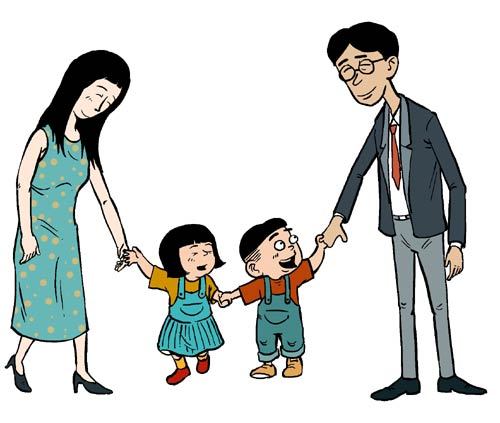 The One-Child Policy isn’t simply a rule like “wear your seat belt” that most people begrudgingly accept. It has been pounded into their minds that having only one child is their moral and patriotic duty. To have more than one child would be to betray China. The punishments for violating the policy have been strict and brutal, creating a culture of fear of the government and authorities. Forced abortions are still commonplace today. Abortion under duress even more so. Families who violate the policy have to pay huge, life-crushing fines. Families who cannot pay the fines can be denied jobs and housing. Children born outside the policy are denied personhood, by which I mean they are denied a hukou or official registration. Hukou-less persons are denied schooling, healthcare, housing, jobs, bank accounts, train/bus/airplane tickets, and cannot marry. They don’t exist in their own country. They also can never leave because they cannot apply for a passport.
The One-Child Policy isn’t simply a rule like “wear your seat belt” that most people begrudgingly accept. It has been pounded into their minds that having only one child is their moral and patriotic duty. To have more than one child would be to betray China. The punishments for violating the policy have been strict and brutal, creating a culture of fear of the government and authorities. Forced abortions are still commonplace today. Abortion under duress even more so. Families who violate the policy have to pay huge, life-crushing fines. Families who cannot pay the fines can be denied jobs and housing. Children born outside the policy are denied personhood, by which I mean they are denied a hukou or official registration. Hukou-less persons are denied schooling, healthcare, housing, jobs, bank accounts, train/bus/airplane tickets, and cannot marry. They don’t exist in their own country. They also can never leave because they cannot apply for a passport.
People in China also believe that having a second child is too expensive. When you only have one child, it is easy to think that that child has to have the best life – the best clothes, the best education, live in the best neighborhood, go to the best college, and so on. Because of this, many people believe their expenses for raising a second child will double. Instead of finding ways to cut costs by sending them to a less expensive school, many families who qualify for a second child opt out because of financial concerns.
After living your whole life in this kind of environment, it is difficult to suddenly change your way of thinking and have a second child.
Last year, when the restrictions were first eased, the government estimated that 90 million children could be born under the new policy. Only around 250,000 were. Here in Shenzhen, it was estimated that 25,000 couples qualified to have a second child. Only around 1,500 were born – in a city of 14 million people. The effect of a limited second-child policy was almost negligible. Some scholars estimate it will take 70-100 years for China’s birthrate to return to normal.
Current Second Children Born Outside the One-Child Policy Will Still Be Denied Personhood
There has been no indication that current second children who were born outside the One-Child Policy will be granted clemency. Their parents still broke the law and they and their children must suffer for that.
Any child born outside the Two-Child Policy Will Be Denied Personhood
Any child born outside the new two-child policy will still be denied a hukou.
Women Who Get Pregnant Outside China’s Family Planning Polices Are Punished
 China’s Family Planning Policies go beyond the One-Child Policy. In China, women who get pregnant out of wedlock can be legally fired from their job. Women who have a child out of wedlock can be denied housing. Women who have a child out of wedlock are subject to the same fines as couples who have children outside the One-Child Policy. Chinese women who are not married are not allowed to store their eggs for future fertility treatments.
China’s Family Planning Policies go beyond the One-Child Policy. In China, women who get pregnant out of wedlock can be legally fired from their job. Women who have a child out of wedlock can be denied housing. Women who have a child out of wedlock are subject to the same fines as couples who have children outside the One-Child Policy. Chinese women who are not married are not allowed to store their eggs for future fertility treatments.
And, of course, children born to women who are not married can also be denied personhood.
Just to be clear, men cannot be fired from their jobs nor are they fined for having a child out of wedlock.
Nothing Has Changed
Long story short – this isn’t good enough. China’s family planning policies are still in violation of basic human rights. Do not give China any kudos for this. Only when China ends all of its family planning policies and every person in China is recognized as a human being will it be good enough.
What do you think about the new Two-Child Policy? Do you think it will have much of an effect? Let me know what you think in the comments.
Interview with Kay Bratt – Author of The Palest Ink
Today I’m happy to have talked to Kay Bratt, the author of The Palest Ink . Kay Bratt is a child advocate and author of the series Tales of the Scavenger’s Daughters and the acclaimed memoir of the years she spent working in Chinese orphanages, Silent Tears: A Journey of Hope in a Chinese Orphanage . After living in China for several years, Bratt now resides in the foothills of the Blue Ridge Mountains in South Carolina with her husband, daughter, dog, and cat. Learn more about her memoir and works of fiction at www.kaybratt.com.
Be sure to read all the way to the end for your chance to win a copy of The Palest Ink!
For those who may not be familiar with your background, tell me about your experiences in China and how they influenced your writing.
 I lived in China for almost five years when my husband’s company relocated us there for business. During my years as an expat, in addition to learning to combat culture shock the bulk of my time and energy was spent on volunteer work for the local orphanage. Not only did I find myself attaching to many of their children, but it was in the midst of the women who worked there that I became captivated by the lives of the working class Chinese people.
I lived in China for almost five years when my husband’s company relocated us there for business. During my years as an expat, in addition to learning to combat culture shock the bulk of my time and energy was spent on volunteer work for the local orphanage. Not only did I find myself attaching to many of their children, but it was in the midst of the women who worked there that I became captivated by the lives of the working class Chinese people.
How did this latest book come about? Is it part of a larger narrative?
The idea for The Palest Ink came about a few years after the first book in my best-selling series, The Tales of the Scavenger’s Daughters was published. That book was inspired by a newspaper article I’d read of a scavenger in China who took in abandoned girls and raised them. The main character in the book is elderly, but it started with a prologue of him escaping from a commune when he was but a young man. His experiences during the Cultural Revolution were alluded to and set the foundation for the kind of man he grew into. Readers commented often in reviews and on social networking that they’d love to know more about his time during that period. As I wrote each subsequent book to highlight more about him and his adopted daughters, more ideas came to me about experiences that could’ve shaped his self-sacrificing persona. I began doing more research on the Cultural Revolution and the survivor stories I stumbled onto were captivating yet harrowing. Many of those accounts are woven within the pages of The Palest Ink to bring authenticity to the novel.
Many of your works focus on your own experiences in China, but this book was set in the Cultural Revolution. Was this book a step outside of your comfort zone as a writer?
I began planning this book almost two years ago and during that time, I told myself I wasn’t yet ready to write it. It took those two years of making notes and gathering research before I felt comfortable enough to tackle such an important story set during a catastrophic time in history for China. It is my goal to use my characters and their heart-wrenching storylines in The Palest Ink to pay tribute to those who survived, and to the memory of those who did not.
What are you working on now/next?
Currently I’m tackling a story based on the injustices the Chinese experienced upon immigrating to the United States in the late nineteenth century. Two of the main characters were bought and used as domestic servants in Hong Kong and decide to make their break for freedom, but find that Gold Mountain isn’t all it was made out to be in their imaginations. Another child, destined to be abandoned in China, is smuggled out of the country and those bound to protect her will find that she ultimately is the answer to their quest for security.
Stepping away from the book for a moment, would you like to share anything about your work as an advocate for children in the Chinese welfare system?
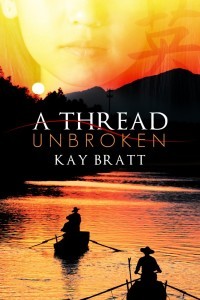 Working as an advocate for children in the Chinese welfare system, I came face to face with many myths and misconceptions. I myself came into the orphanage with pre-conceived notions and it took immersing in their culture for several years to become re-educated about their child welfare issues. Most importantly to me, it is untrue that the Chinese do not love their daughters. Many baby girls are relinquished for the reason that the family cannot afford them, especially when they are born with any sort of special need or medical condition. Though hard, mothers often relinquish their children in the hopes that the child will receive the care they need and is not afforded by the mother or her family. The majority of children I knew in the orphanage had some sort of special need or medical condition. Rarely did I meet an absolutely healthy child.
Working as an advocate for children in the Chinese welfare system, I came face to face with many myths and misconceptions. I myself came into the orphanage with pre-conceived notions and it took immersing in their culture for several years to become re-educated about their child welfare issues. Most importantly to me, it is untrue that the Chinese do not love their daughters. Many baby girls are relinquished for the reason that the family cannot afford them, especially when they are born with any sort of special need or medical condition. Though hard, mothers often relinquish their children in the hopes that the child will receive the care they need and is not afforded by the mother or her family. The majority of children I knew in the orphanage had some sort of special need or medical condition. Rarely did I meet an absolutely healthy child.
How can expats in China help China’s orphans?
In addition to supporting reputable non-profit organizations already on the ground in China, if an expat can connect with a volunteer group that does work at their local orphanage, it’s best to work with them to help China’s orphans. A volunteer there can give a list of accurate needs, as well as monitor how any donations are used to confirm it is for the children’s best interest. If there is not a volunteer group already in place, an expat can work with the facility to start one! One can read my memoir, Silent Tears; A Journey of Hope in a Chinese Orphanage, to see how it all worked out for me.
~*~
“Bratt brings to life the struggle of two individuals during China’s terrible time that all should know about with an honest, yet compassionate style. She brings us as close as we ever want to be to an evil time, yet shows some found the courage to preserve their dignity. A must-read.”
—Mingmei Yip, author of Skeleton Women and other China-inspired novels
“The Revolution itself is well-documented and the historical significance of Chairman Mao’s Red Guard leaves fear in its wake. The danger and fear that come through the writing create discomfort and unrest, much as it must have been during the times. The danger is palpable, and adds to the chaotic feelings left after the reading of this work. If you enjoy history, revolution, courage, romance and family, then this will make a great work for your library. Kay Bratt has given us a work of intensity.” —Blogcritics.org
“A mesmerizing and moving story of coming of age.” —Fresh Fiction
“The Palest Ink, the story of Benfu’s early years fills in so many gaps in my knowledge of China during the Cultural Revolution, a topic that is practically taboo in China right now. This prequel to the four Scavenger’s Daughters books shows me what the Chinese term ‘eating bitter’ really means. Kay Bratt sure has done her research, and presents the tale of those tumultuous years in a fascinating narrative.” —Sibylla Grottke, WanderlustAndChineseInk.com
THE PALEST INK
by Kay Bratt
Author and child advocate Kay Bratt has captivated readers all over the world with her compelling and vivid books about China and its people. She lived there for almost five years and was drawn to the cause of China’s forgotten and abused orphans. Her experiences working in a local orphanage and fighting against the Chinese bureaucracy as she tried to change the social conditions led her to write a bestselling memoir, Silent Tears, A Journey of Hope in a Chinese Orphanage. She also wrote a series of novels set in modern day, Tales of the Scavenger’s Daughters, based on the true stories of some remarkable Chinese people she’d read about. Over the years, readers have clamored to know the origin story of the series’ beloved character, Benfu.
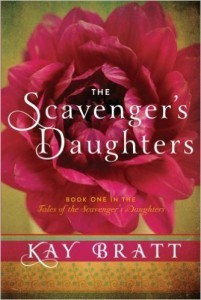 Now, here is Benfu’s story in THE PALEST INK (Lake Union Publishing; Publication date: October 27, 2015), a beautifully rendered novel about two best friends from different walks of life, set against the backdrop of Chairman Mao’s tumultuous Chinese Revolution.
Now, here is Benfu’s story in THE PALEST INK (Lake Union Publishing; Publication date: October 27, 2015), a beautifully rendered novel about two best friends from different walks of life, set against the backdrop of Chairman Mao’s tumultuous Chinese Revolution.
In 1966, Mao Zedong launched the Cultural Revolution in order to reassert his authority over the Chinese government. All over China he shut down the nation’s schools, calling for a massive youth mobilization to take current party leaders to task for their embrace of bourgeois values and lack of revolutionary spirit. In the months that followed, the movement escalated quickly as the students formed paramilitary groups called the Red Guards and attacked and harassed members of China’s elderly and intellectual population. At the beginning of the Revolution, Benfu is a sheltered son of scholars who is looking forward to a promising career as a violinist. On the other side of town, Pony Boy belongs to a close-knit lower class family who is faced with a perilous opportunity. The upheaval all around them forces Benfu and Pony Boy to grow up quickly, and they must make some hard choices between family, friendship, and loyalty to country while doing their best to survive one of the most chaotic times in history.
Kay Bratt tells a story both intimate and epic, weaving fiction with real-life accounts of innocent people who were persecuted, beaten and imprisoned, with their families torn apart. She discovered through her research that the truth about what really happened during what was informally called “The Ten Years of Chaos” was all but wiped from the history books due to Mao’s efforts to suppress accounts of his abuse of power and hide them from the world.
For readers of Lisa See and Amy Tan, or anyone eager for an engrossing book about friendship, family, loyalty and the fight for truth and justice, THE PALEST INK will inspire you, consume you, and touch your heart.
~*~
About the author
 Kay Bratt is a child advocate and author. She was born in Kansas and lived all over the U.S. before settling in the Carolinas. Kay’s experiences of growing up as the constant new kid—and usually one of the poorest—ignited a passion to advocate for children in need when she became an adult.
Kay Bratt is a child advocate and author. She was born in Kansas and lived all over the U.S. before settling in the Carolinas. Kay’s experiences of growing up as the constant new kid—and usually one of the poorest—ignited a passion to advocate for children in need when she became an adult.
When Kay’s husband’s career took them overseas to live in China, she was drawn to the cause of that country’s forgotten and abused orphans and devoted herself to working in a local orphanage. She found that journaling helped her to bear the emotional impact of the abhorrent conditions she witnessed. Upon her return to the U.S. after five years in China, Kay wrote about her experiences and her fight against the Chinese bureaucracy as she tried to change the social conditions in a bestselling memoir, Silent Tears, A Journey of Hope in a Chinese Orphanage. The book resonated with readers all over the world and became a bestseller. She continued to write, but it was when she came across an article about a scavenger in China who took in abandoned children that she was inspired to write the book that launched her bestselling fiction series, The Tales of the Scavenger’s Daughters.
Her new novel, THE PALEST INK, a prequel of sorts to The Tales of the Scavenger’s Daughters, will be published by Lake Union Publishing on October 27, 2015.
Kay continues to be a voice for children who cannot speak for themselves. In addition to using her writing to gain awareness, she has actively volunteered for several non-profit organizations, including An Orphan’s Wish (AOW), Pearl River Outreach, and the Court Appointed Special Advocates (CASA) for abused and neglected children. In China, she was honored with the Pride of the City award for humanitarian work.
Kay lives in South Carolina, at the foothills of the Blue Ridge Mountains with her husband, daughter, dog, and cat.
October 29, 2015
Happy Halloween from Two Americans in China!
I can’t believe it has been nearly two months since I last posted! Ugh! I can’t believe I let it go this long. I have just been so busy, I kind of had to let a few things go for a while. But I have some great posts planned! Starting today!
Happy Halloween from China!
The Chinese don’t have an exact equivalent for Halloween, but they do have a strong appreciation for all things creepy. Western Halloween is also growing in popularity, especially among college students. Here are few of the most popular Chinese ghosts and demons.
The Nügui
 The nügui (女鬼, literally ‘female ghost’) is typically the spirit of a woman who was wronged or sexually abused in life. She usually either commits suicide while wearing a red dress or her family can clothe her in a red dress instead of the traditional white garb of morning for her funeral. The nügui was the source for my short horror story “My Parents Buried Me in a Red Dress.” You can read an excerpt at my other site and sign up to win a $10 Amazon gift card!
The nügui (女鬼, literally ‘female ghost’) is typically the spirit of a woman who was wronged or sexually abused in life. She usually either commits suicide while wearing a red dress or her family can clothe her in a red dress instead of the traditional white garb of morning for her funeral. The nügui was the source for my short horror story “My Parents Buried Me in a Red Dress.” You can read an excerpt at my other site and sign up to win a $10 Amazon gift card!
The Jiangshi
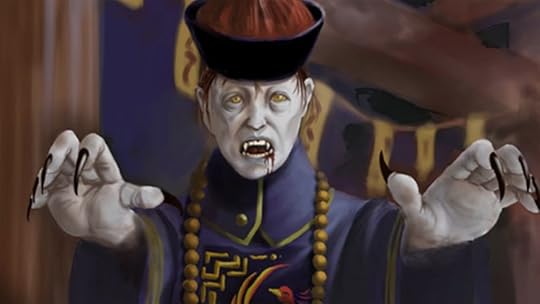 In Chinese tradition, zombies and vampires are basically the same thing – jiangshi (僵尸). They are dead creatures who rise in order to devour the qi (气 , the life force) of the living. They hop instead of walk since, because of rigor mortise, their knees don’t bend.
In Chinese tradition, zombies and vampires are basically the same thing – jiangshi (僵尸). They are dead creatures who rise in order to devour the qi (气 , the life force) of the living. They hop instead of walk since, because of rigor mortise, their knees don’t bend.
They are typically dressed as Qing Dynasty officials because the first recorded account of a jiangshi was during the Qing Dynasty.
According to Qing Dynasty scholar Ji Xiaolan as written in his book Yuewei Caotang Biji (閱微草堂筆記), there are many reasons why a person might return to the world of the living as a jiangshi such as through the use of supernatural arts to resurrect the dead or a corpse could absorbs sufficient yang qi to return to life. Jiangshi often populate Chinese horror films and stories and are a popular Halloween costume.
Ox Head and Horse Head
 Ox Head (牛头) and Horse Head (马面) are two mythical guardians of the entrance of Hell. They both have the bodies of large, muscular men, but their heads are of an ox and a horse. They are the first creatures the dead encounter on their journey to the underworld. In some stories, they escort the dead on their journey, because they are actually pretty nice guys. They also feature in my story “My Parents Buried Me in a Red Dress,” but they aren’t in the published excerpt.
Ox Head (牛头) and Horse Head (马面) are two mythical guardians of the entrance of Hell. They both have the bodies of large, muscular men, but their heads are of an ox and a horse. They are the first creatures the dead encounter on their journey to the underworld. In some stories, they escort the dead on their journey, because they are actually pretty nice guys. They also feature in my story “My Parents Buried Me in a Red Dress,” but they aren’t in the published excerpt.
Hungry Ghosts
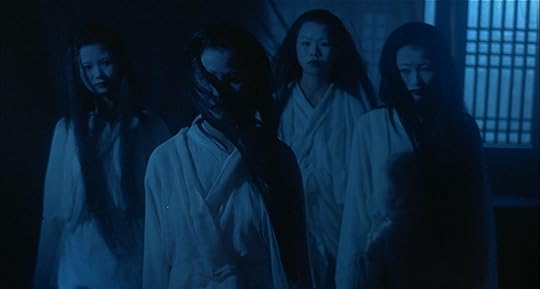 Hungry Ghosts ( 餓鬼 èguǐ) are the most common type of ghost in China. In general, Chinese believe that all people become ghosts when they die, at least for a little while. It can take 10-30 days (or even longer) for a dead soul to reach the entrance to the underworld. Even in the underworld, the ghosts typically linger for a long time. During that time, the ghost must be taken care of to it can safely pass on. It must be fed, clothed, given money, and venerated. If any of these things are lacking, the ghost can become “hungry” and remain between the world of the living and the underworld.
Hungry Ghosts ( 餓鬼 èguǐ) are the most common type of ghost in China. In general, Chinese believe that all people become ghosts when they die, at least for a little while. It can take 10-30 days (or even longer) for a dead soul to reach the entrance to the underworld. Even in the underworld, the ghosts typically linger for a long time. During that time, the ghost must be taken care of to it can safely pass on. It must be fed, clothed, given money, and venerated. If any of these things are lacking, the ghost can become “hungry” and remain between the world of the living and the underworld.
I hope you enjoyed this little primer about Chinese ghosts and demons. Happy Halloween!
Don’t miss any of our great posts! Follow us on Facebook and Twitter and subscribe to our newsletter!
August 31, 2015
Robot Restaurant in Harbin, China
Today’s guest post was submitted by Barbie Jazz.
The future is here! A restaurant in downtown Harbin employs around 20 robots instead of humans to take orders, cook, serve, and entertain guests. ![robot-restaurant-5[6]](https://i.gr-assets.com/images/S/compressed.photo.goodreads.com/hostedimages/1441148836i/16069143._SX540_.jpg) The restaurant opened back in June 2012 and remains a popular tourist spot in Heilongjiang.
The restaurant opened back in June 2012 and remains a popular tourist spot in Heilongjiang.
As soon as guests walk in, a front-of-the-house robot warmly greets them with, “Earth person, hello! Welcome to Robot Restaurant!” Then, they are guided to an empty table. After browsing the menu, guests can place their orders through the robots, which are then relayed to robot chefs who are able to consistently cook several types of noodles and dumplings. Once the dishes have been cooked, a robot waiter will take them and deliver them to the customers’ tables. The robots are true eye candy, especially when they start to sing after serving the meals to guests.
![robot-restaurant-1[2]](https://i.gr-assets.com/images/S/compressed.photo.goodreads.com/hostedimages/1441148836i/16069144._SX540_.jpg) China Daily estimates that these entertaining and useful robots range from 1.3 – 1.6 meters in height. They can show more than 10 different facial expressions and speak simple Chinese. Perhaps these robots show a sad face when a food item is out of stock. Of course, not everything works automatically as some of the robots’ movements are controlled by human staff sitting inside a computer room.
China Daily estimates that these entertaining and useful robots range from 1.3 – 1.6 meters in height. They can show more than 10 different facial expressions and speak simple Chinese. Perhaps these robots show a sad face when a food item is out of stock. Of course, not everything works automatically as some of the robots’ movements are controlled by human staff sitting inside a computer room.
The robots were designed and created by a local business called Harbin Haohai Robot Company. Liu Hasheng, the company’s chief engineer, says that the management invested around 5 million yuan into the restaurant, with each robot costing around 200,000 – 300,000 Yuan. Food costs around 30 – 60 yuan per item, so the company is probably just using the restaurant as a promotional material than an actual profitable business. Perhaps the company is doing this so they can get noticed by big businesses, particularly the gambling industry in Macau, which is always in need of personnel. 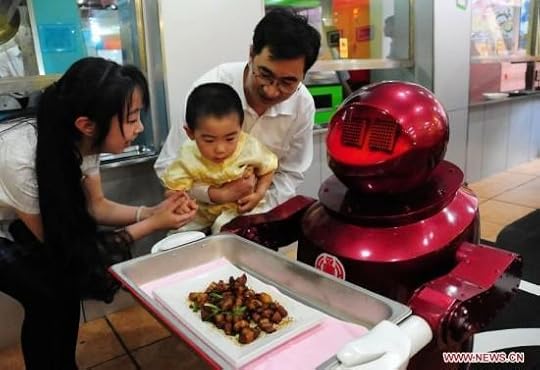 These establishments operate 24 hours a day, 7 days a week, making robots the perfect substitute for humans during dead hours. According to resource website Mayfair Casinos, the Venetian Macao is the biggest hotel and casino establishment in Macau, and Harbin Haohai’s robots will make perfect employees for this enormous place that is always in need of able hands.
These establishments operate 24 hours a day, 7 days a week, making robots the perfect substitute for humans during dead hours. According to resource website Mayfair Casinos, the Venetian Macao is the biggest hotel and casino establishment in Macau, and Harbin Haohai’s robots will make perfect employees for this enormous place that is always in need of able hands.
The Robot Restaurant in Harbin isn’t the first robot restaurant in the world. In 2010, a restaurant in Jiang used robots to replace line cooks. In Hajime Restaurant in Thailand, robots that look like samurai have replaced the job of human waiters.
Two Americans in China is always accepting guest posts and books for review. For more information, contact us at TwoAmericansinChina@gmail.com.
August 26, 2015
Liu Cixin’s Big Hugo Win That Almost Wasn’t
The following was originally published in the Shenzhen Daily.
By now, almost everyone in China has heard that Liu Cixin was the big winner at the 2015 Hugo Awards, becoming the first Chinese novelist to win science fiction’s highest honor of best novel for his book “The Three-Body Problem.” What many have not heard, however, is about how Liu almost didn’t win thanks to a massive campaign by a group of people known as the Sad Puppies who actively worked inside the World Science Fiction Society to block people of color, women, and LGBT+ people from being nominated or winning the competition.
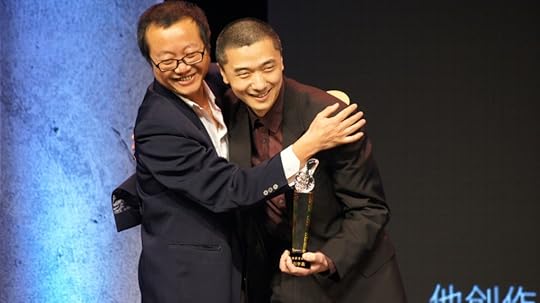
Liu Cixin (L), author of “The Three-Body Problem,” and Ken Liu (R), the book’s English translator
The Hugo Awards first started back in 1953 to honor writers in a genre that, at that time, was largely shunned by the literary community. The Hugo Awards are known for having honored some of the “Gods of Science Fiction,” such as Isaac Asimov, Arthur C. Clarke, Harlan Ellison, Philip K. Dick, and Robert A. Heinlein. However, for much of the 1900s, nominees and supporters of the Hugo Awards were largely male and white.
But as readers of science fiction became more diverse, so did the authors, and over the last 20 years, women and minorities were also being recognized with Hugos. For one set of science fiction writers and fans, though, they believed the more progressive and inclusive atmosphere of the Hugo Awards was threatening the status quo and decided to fight back. This group called themselves the Sad Puppies.
Liu’s novel “The Three-Body Problem” has been growing in popularity for years. After being originally released as a serial in China in 2006, the Chinese novel version was released in 2007 and immediately became a best seller. The English version of the novel, translated by Ken Liu, was released in 2014 to critical acclaim and was quickly nominated for a Nebula Award, another important science fiction award. Many assumed the novel would be the one to beat at the Hugo Awards, but when the Hugo nominations were announced in April 2015, “The Three-Body Problem” wasn’t on the list. What went wrong?
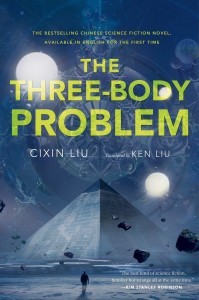 The Sad Puppies are all sci-fi writers and Hugo nominees — though none of them has ever won a Hugo. The Puppies believe that race, gender and sexual orientation should not be a factor when it comes to Hugo nominations. However, they also believe that anytime a minority author is nominated, it is mostly because of their race or gender and not because of the quality of their work. They seem to believe that only straight, white males are capable of writing good science fiction.
The Sad Puppies are all sci-fi writers and Hugo nominees — though none of them has ever won a Hugo. The Puppies believe that race, gender and sexual orientation should not be a factor when it comes to Hugo nominations. However, they also believe that anytime a minority author is nominated, it is mostly because of their race or gender and not because of the quality of their work. They seem to believe that only straight, white males are capable of writing good science fiction.
So this year, the core group of Sad Puppies rallied together people who agreed with their ideology and became the majority voters for this year’s Hugo Awards. As a result, most minority authors were left off the list of nominees, including Liu Cixin.
Thankfully, not all of the nominated science fiction authors agreed with what the Sad Puppies had done. Many nominees who were supported by the Puppies were horrified by what had happened. Author Marko Kloos, who was a first-time Hugo nominee for his novel “Lines of Departure,” declined his nomination, which made room for the inclusion of Liu’s novel.
Kloos said on his blog, “I cannot in good conscience accept an award nomination that I feel I may not have earned solely with the quality of the nominated work.”
Annie Bellet, another first-time nominee who was selected by the Sad Puppies even though she is a woman, also refused her nomination. Bellet said, “I love the Hugo Awards. To be nominated was awesome. But I’m a writer. That’s what I want my public face to be. I don’t want people to think of me as some political figure, or some ball in the political game.”
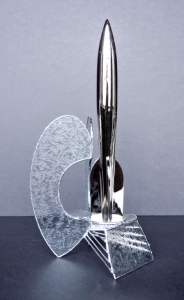
A coveted Hugo
The Hugo Award voters — fans of the genre — also took a stand against what the Sad Puppies had done to manipulate the awards. The World Science Fiction Society received a record number of Hugo votes this year — 65 percent more than last year. Five categories, those with only Puppy-backed nominees, did not receive enough votes to hand out awards, and Liu became the first Chinese author to take home the best novel award.
George R. R. Martin, the author behind the hit novels and HBO series “Game of Thrones,” wondered if all the new voters this year had gathered to support the integrity of the Hugos, and they clearly did. This year’s Hugo Awards have opened up a whole new world of opportunities for Chinese science fiction, but it is disheartening to realize how close “The Three-Body Problem” came to not winning.
This year’s Puppy fiasco was a game-changer not just for Chinese science fiction but for the Hugo Awards themselves. While it is a good thing that the Puppy nominees did not win in five categories, it means that many excellent science fiction authors — of all races, genders and sexual orientations — were shut out of the competition, which is a great tragedy for authors who work so hard on their craft.
There are currently several changes being considered by the World Science Fiction Society to make sure the Hugo Awards remain fair and inclusive in the future.
Kloos said of “The Three-Body Problem,” “I honestly can’t think of a novel I would have rather seen on the ballot this year than this one. It’s precisely the kind of science fiction the genre needs — hard and entertaining science fiction with great depth and scope. It’s truly deserving of an award.” At least some good came out of this year’s Hugo Awards.
August 20, 2015
A Chinese Valentine’s Story
Happy Qixi Festival Everyone!
I wrote the following a couple of months ago but thought it was appropriate to share today, on Chinese Valentine’s Day!
The Chinese equivalent of Valentine’s Day is known as Qixi Festival, which is held of the seventh day of the seventh lunar month. Qixi celebrates the story of the cowherd and the weaver girl. Here is my version of the story…
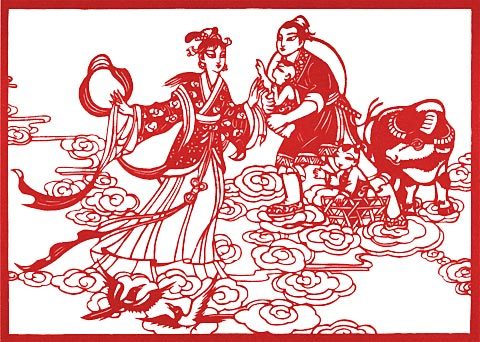 My mother was the Goddess of Heaven. I was her seventh daughter, called Zhīnǚ. My sisters and I all had special gifts. One sister was a healer, another was a carer of babies, another was a protector of the seas. I was a weaver. While many women prayed for my help with sewing their beautiful wedding clothes or cloths to swaddle their newborns, I was much more than that. While my sister was the protector of the seas, it was I that stitched then together. While my mother was the Goddess of Heaven, it was I who sewed diamonds into the blackness so that stars would shine down on the earth.
My mother was the Goddess of Heaven. I was her seventh daughter, called Zhīnǚ. My sisters and I all had special gifts. One sister was a healer, another was a carer of babies, another was a protector of the seas. I was a weaver. While many women prayed for my help with sewing their beautiful wedding clothes or cloths to swaddle their newborns, I was much more than that. While my sister was the protector of the seas, it was I that stitched then together. While my mother was the Goddess of Heaven, it was I who sewed diamonds into the blackness so that stars would shine down on the earth.
I loved the Earth and all its creatures. Another sister of mine painted all the beautiful rivers and mountains. Another created all the animals. But they let me sew them with exquisite embellishments. I sewed the spots on the leopards, the eyes on the peacocks, and the decorations on butterflies. But the most beautiful thing I ever saw was not an animal, but a cowheard. His name was Niúláng.
To most humans, he was nothing significant. He was poor, his clothes were plain, brown wool, his skin was dark from the sun. He would never be rich. He would never have a huge home. He would never be an important man. But I did not need those things. After living for millennia in the heavens, a simple life with a kind and good man seemed like a good life to me.
So I left my heavenly home. The first time I stepped onto the grass with mortal feet, it felt so soft. Even though I was now walking, as I crossed the field to my love, I felt like I was floating. From a faraway distance, Niúláng saw me. He knew what I was immediately. I could never keep a secret from him. He ran to me, swept me up in his arms, and vowed to never let me go. He was so grateful that out of all mortal men I would choose him, he promised to love me all his days.
Our life was sweet and simple. He continued to heard his cows and I worked as an embroidery girl. People from all over the country would flock to me to buy my beautiful silks. We had two daughters of our own. We were happy.
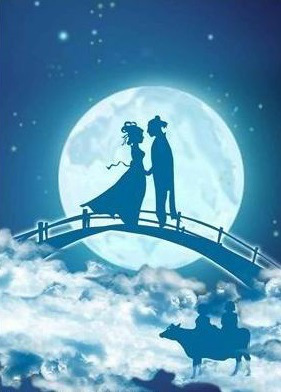 But it was not to last. My mother did not approve of what I had done. Even though my love for Niúláng had nothing to do with her, she felt that I had forsaken her, her gifts to me, and my heavenly life. She was enraged. She came to the earth like a fury. Thunder, rain, and tornadoes like dragon tails ravaged the land as she descended as she crossed the earth in search of me. To protect my lover, my children, and the world, I let her take me back to the sky. But, oh, how my lover wept.
But it was not to last. My mother did not approve of what I had done. Even though my love for Niúláng had nothing to do with her, she felt that I had forsaken her, her gifts to me, and my heavenly life. She was enraged. She came to the earth like a fury. Thunder, rain, and tornadoes like dragon tails ravaged the land as she descended as she crossed the earth in search of me. To protect my lover, my children, and the world, I let her take me back to the sky. But, oh, how my lover wept.
One of my sisters took pity on him. Through one of Niúláng’s prized oxen, my sister of the animals spoke. She told him that if he slaughtered the ox and donned his skin, a great bridge of heaven would appear, which he could cross to find me. This he did without hesitation. He would do anything for me. He took our daughters up in his arms, and ran toward me. I saw them coming.
But so did my mother. As I ran to him and my children, my mother, in her anger, removed a pin from her hair and ripped a river through the sky. She ripped heaven itself asunder to keep me from my mortal family. But even her great rage could not stop true love.
I used my great skill as a weaver to create a new bridge. I called out to the magpies, those loyal birds, and weave them across the sky. Built of love and heavenly power, my mother could not destroy my bridge. I crossed over to the loving, waiting arms of my husband and children, never to be separated again.
A Chinese Valentine’s Story
Happy Qixi Festival Everyone!
I wrote the following a couple of months ago but thought it was appropriate to share today, on Chinese Valentine’s Day!
The Chinese equivalent of Valentine’s Day is known as Qixi Festival, which is held of the seventh day of the seventh lunar month. Qixi celebrates the story of the cowherd and the weaver girl. Here is my version of the story…
 My mother was the Goddess of Heaven. I was her seventh daughter, called Zhīnǚ. My sisters and I all had special gifts. One sister was a healer, another was a carer of babies, another was a protector of the seas. I was a weaver. While many women prayed for my help with sewing their beautiful wedding clothes or cloths to swaddle their newborns, I was much more than that. While my sister was the protector of the seas, it was I that stitched then together. While my mother was the Goddess of Heaven, it was I who sewed diamonds into the blackness so that stars would shine down on the earth.
My mother was the Goddess of Heaven. I was her seventh daughter, called Zhīnǚ. My sisters and I all had special gifts. One sister was a healer, another was a carer of babies, another was a protector of the seas. I was a weaver. While many women prayed for my help with sewing their beautiful wedding clothes or cloths to swaddle their newborns, I was much more than that. While my sister was the protector of the seas, it was I that stitched then together. While my mother was the Goddess of Heaven, it was I who sewed diamonds into the blackness so that stars would shine down on the earth.
I loved the Earth and all its creatures. Another sister of mine painted all the beautiful rivers and mountains. Another created all the animals. But they let me sew them with exquisite embellishments. I sewed the spots on the leopards, the eyes on the peacocks, and the decorations on butterflies. But the most beautiful thing I ever saw was not an animal, but a cowheard. His name was Niúláng.
To most humans, he was nothing significant. He was poor, his clothes were plain, brown wool, his skin was dark from the sun. He would never be rich. He would never have a huge home. He would never be an important man. But I did not need those things. After living for millennia in the heavens, a simple life with a kind and good man seemed like a good life to me.
So I left my heavenly home. The first time I stepped onto the grass with mortal feet, it felt so soft. Even though I was now walking, as I crossed the field to my love, I felt like I was floating. From a faraway distance, Niúláng saw me. He knew what I was immediately. I could never keep a secret from him. He ran to me, swept me up in his arms, and vowed to never let me go. He was so grateful that out of all mortal men I would choose him, he promised to love me all his days.
Our life was sweet and simple. He continued to heard his cows and I worked as an embroidery girl. People from all over the country would flock to me to buy my beautiful silks. We had two daughters of our own. We were happy.
 But it was not to last. My mother did not approve of what I had done. Even though my love for Niúláng had nothing to do with her, she felt that I had forsaken her, her gifts to me, and my heavenly life. She was enraged. She came to the earth like a fury. Thunder, rain, and tornadoes like dragon tails ravaged the land as she descended as she crossed the earth in search of me. To protect my lover, my children, and the world, I let her take me back to the sky. But, oh, how my lover wept.
But it was not to last. My mother did not approve of what I had done. Even though my love for Niúláng had nothing to do with her, she felt that I had forsaken her, her gifts to me, and my heavenly life. She was enraged. She came to the earth like a fury. Thunder, rain, and tornadoes like dragon tails ravaged the land as she descended as she crossed the earth in search of me. To protect my lover, my children, and the world, I let her take me back to the sky. But, oh, how my lover wept.
One of my sisters took pity on him. Through one of Niúláng’s prized oxen, my sister of the animals spoke. She told him that if he slaughtered the ox and donned his skin, a great bridge of heaven would appear, which he could cross to find me. This he did without hesitation. He would do anything for me. He took our daughters up in his arms, and ran toward me. I saw them coming.
But so did my mother. As I ran to him and my children, my mother, in her anger, removed a pin from her hair and ripped a river through the sky. She ripped heaven itself asunder to keep me from my mortal family. But even her great rage could not stop true love.
I used my great skill as a weaver to create a new bridge. I called out to the magpies, those loyal birds, and weave them across the sky. Built of love and heavenly power, my mother could not destroy my bridge. I crossed over to the loving, waiting arms of my husband and children, never to be separated again.
August 18, 2015
Book Review: The Private Papers of Eastern Jewel by Maureen Lindley
The Private Papers of Eastern Jewel is a novelization of the life of Japanese spy Yoshiko Kawashima, who was also known as Eastern Jewel. While the book was interesting, it focused far too much on Yoshiko’s sexuality. The book’s description says:
Peking, 1914. When the eight-year-old princess Eastern Jewel is caught spying on her father’s liaison with a servant girl, she is banished from the palace, sent to live with a powerful family in Japan. Renamed Yoshiko Kawashima, she quickly falls in love with her adoptive country, where she earns a scandalous reputation, taking fencing lessons, smoking opium, and entertaining numerous lovers. Sent to Mongolia to become an obedient wife, Yoshiko mounts a daring escape and eventually finds her way back to Peking high society—this time with orders from the Japanese secret service.
Based on the true story of a rebellious woman who earned a controversial place in history, The Private Papers of Eastern Jewel is a vibrant reimagining of a thrilling life—a rich historical epic of palace intrigue, sexual manipulation, and international espionage.
The book followed Yoshiko’s sex life more than her life. One could say that Yoshiko’s sex life is inseparable from her life, which may be true, she did wield her sexuality like a weapon, but she was much more than that. In fact, many of the more interesting parts of her life, such as the fact that she led a cavalry of 3,000 men, was not even mentioned. She was also a pop culture figure in her own time. She released a collection of songs, was a popular radio personality, and there were many dime novels written about her exploits. She was an effective spy in her own right, not just as a hanger-on of the spies she was involved with. But all of this is left out of The Private Papers of Eastern Jewel. Everything Yoshiko did that didn’t require her to have sex with someone was left out of the book. I would have enjoyed the book more if it had focused on Yoshiko’s life on the whole and not just this one aspect.

Author Maureen Lindley
I also take issue with the descriptions of Yoshiko’s earliest sexual experiences. When Yoshiko was fifteen-years old, she was raped by her grandfather, yet the book passes this incident off as consensual. When she was only sixteen, her step-father acted as a pimp, handing her over to his friends to do as they wish, but again, it is written as though Yoshiko is complicit in these encounters. The idea that Yoshiko was routinely sexually brutalized by her family never comes up, but is passed off as Yoshiko embracing and learning how to wield her sex.
While the book is classified as historical fiction, it had more elements of an erotica. While I have no problem with erotica (and even write erotica myself), it was unexpected, so readers should be made more aware of the book’s content before picking it up.
Have you read The Private Papers of Eastern Jewel ? What did you think?
If you enjoyed this review, you can catch all of my reviews here.
Have you written a book with some connection to China or the Chinese? I review books in any genre! Send me an email at twoamericansinchina@gmail.com to schedule your review.




